New Delhi: It doesn’t particularly come as a surprise. But one of the biggest and all-time bestsellers from LeftWord Books has been a ferocious unmasking of the Rashtriya Swayamsevak Sangh by AG Noorani. Called RSS: A Menace to India, the book was published in 2019, coinciding with the Modi government’s second term.
In a time when books deifying the RSS and its personalities are at an all-time high, the success of Noorani’s final evisceration of what is now the dominant Indian narrative is also a testament to how LeftWord Books continues to thrive and grow. Defying the public assault on Left ideology and the widespread claim that their beleaguered ideologues are in retreat—starved of both audience and funds—LeftWord Books is 25 this year. Contrary to popular discourse, their constituents are doubling down and circling the wagon in Modi’s India.
“Overall, the experience has been that there’s more interest in what we’re doing from a readership perspective, both in the previous NDA government and now,” said Sudhanva Deshpande, managing editor of LeftWord Books. “Many of our titles have done well in both [NDA] governments.”
Last year, its highest selling title was journalist and NewsClick founder Prabir Purkayastha’s Keeping up the Good Fight. The book frames Purkayastha’s life through his incarcerations under two different “authoritarian regimes”. One under Indira Gandhi, the other Narendra Modi.
In 25 years, the texture of the country, people say, has changed irrevocably. The Right-wing’s consummate conquest has been political, social, and cultural. The book publishing sector is also changing. But the space for contrarianism has grown, and an entirely new generation is entering the ecosystem of LeftWord Books in their hunt for an alternative view.
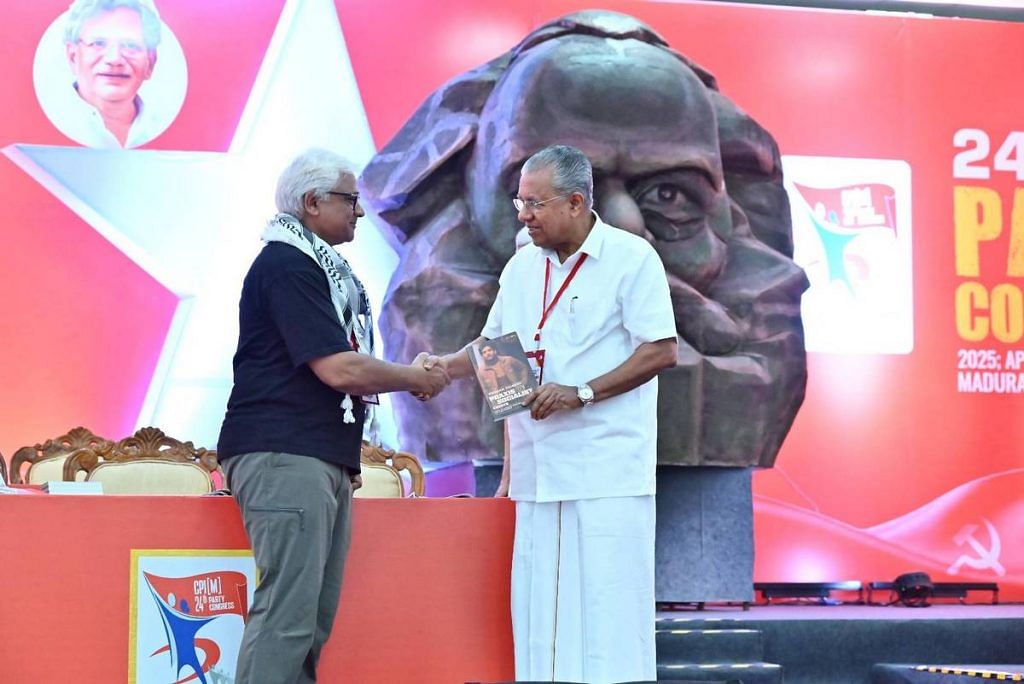
“What’s really remarkable is the number of young people. The vast majority of people who come to us are in their 20s and late teens,” said Deshpande. “It’s stunning. These are people who want to discover the world. I find that to be exciting.”
LeftWord Books’ biggest problems aren’t political. What’s plaguing them is structural, a byproduct of a publishing landscape that has changed unrecognisably in the past two decades. They’ve had to contend with a global pandemic, new patterns of consumption, and the familiar slew of problems that accompany the indie tag.
”The fact that we’re a Left-wing publisher in a country governed by a Right-wing party—I don’t want to respond to it that way. We are one of many independent publishers. I don’t want to project this as unusual,” said Deshpande.
A pattern of growing interest around dissenting ideas in politically inhospitable climes has been seen across geographies. A 2016 Financial Times report described an explosion of “subversive” literature in Turkey, following “political volatility” under Recep Tayyip Erdogan. A new genre, “underground realism” took shape. But there’ve been crackdowns too. Hungary, under Viktor Orban, witnessed the country’s largest publishing house, Libri, taken over by a foundation linked to the Prime Minister. Several authors then moved to smaller independent presses.
Nobody was ready to publish me. LeftWord was the only platform that gave me space… luckily the book got a great response
-Nehal Ahmed, author of Nothing Will be Forgotten: From Jamia to Shaheen Bagh
“The space for Left books is always a growing one—even, and perhaps especially, in times of Right-wing ascendancy, politically speaking,” said Indira Chandrashekhar, founder and publisher of Tulika Books, which puts out titles that are “broadly Left”, without aligning with any one party.
LeftWord Books, however, is specific about its politics. It was founded by three CPI(M) comrades in 1999: Prakash Karat, Sitaram Yechury, and trade unionist Sukomal Sen.
“We wanted to publish our own approach to Marxism, inflected as it is by anti-colonialism and national liberation. We were interested in doing books about India from that standpoint, which meant cultivating new writers on the Indian reality after liberalisation,” said Vijay Prashad, chief editor at LeftWord Books and executive director of Tricontinental Social Research. “LeftWord has since emerged as one of the most important Marxist publishing houses in the world.”
Its authors have included Marxist scholar Aijaz Ahmad, editor N Ram, and lawyer Teesta Setalvad.
Karat continues his role as founding managing director, while Yechury resigned from LeftWord Books’ holding company as director after being elected as a Member of Parliament, citing a conflict of interest.
“It did not even count as a drop in the ocean in terms of turnover. But a principle is a principle,” said Deshpande.
Also Read: Books on Modi era are the new rage. Publishers race to keep up with the churn in India
Publishing against the grain
No mainstream publishing house would touch PhD student Nehal Ahmed’s book. Titled Nothing Will be Forgotten: From Jamia to Shaheen Bagh, it traces the peaceful agitation that culminated in police repression, through the eyes of a scholar at Jamia Millia Islamia.
“Nobody was ready to publish me. LeftWord was the only platform that gave me space,” Ahmed said. “Other publishing houses wouldn’t have been invested in my literary growth. They would accept me only as a political writer.”
At the time, Ahmed was a first-time author who simply emailed his manuscript. There was no agent, no PR machinery propelling his book forward. He also weaves poetry into his writing—something his editor, who was “well-versed” in poetry, actively encouraged. Instead of being asked to tweak the narrative, he was given editorial freedom. He described the experience not only as smooth, but “beautiful”. The book came out in 2022.
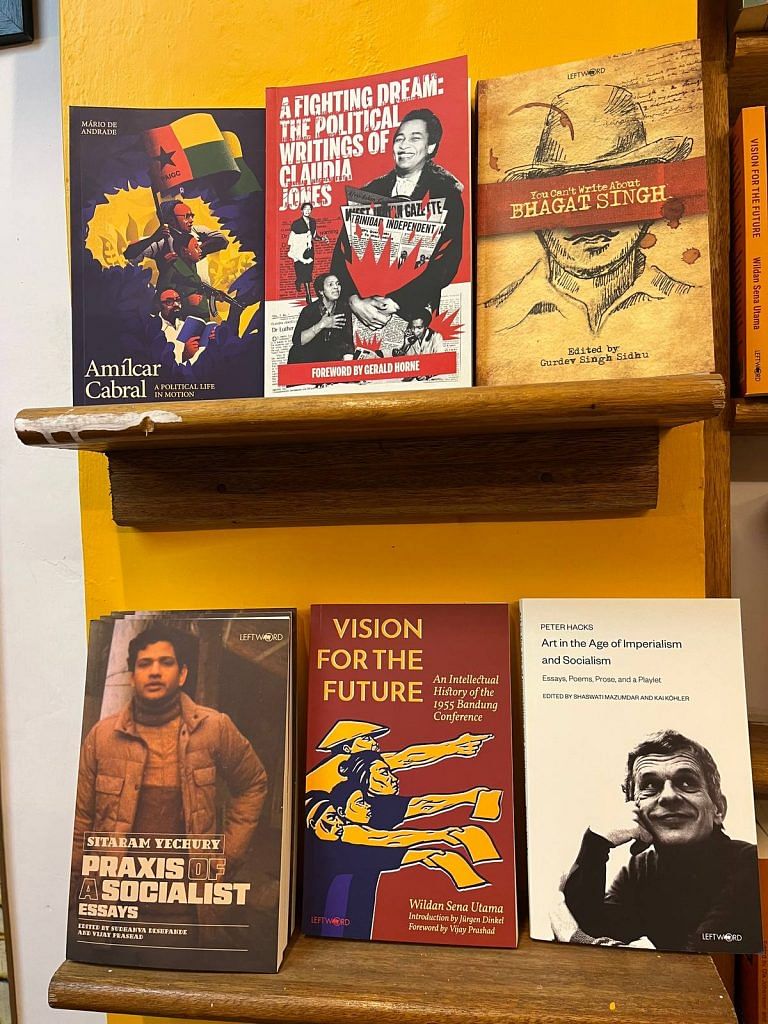
Though he worried about readership and accepted early on that his book wouldn’t be peppered across bookstores or airport bookshelves, he was pleasantly surprised.
“At that point, publishing was more than enough, I wasn’t even expecting any money. But luckily the book got a great response,” he said. “It was translated and reviewed by all the major newspapers.” In 2023, it was also shortlisted for the Sahitya Akademi Yuva Puraskar.
The Left-wing universe is often caricatured as an out-of-touch echo chamber, removed from reality. But LeftWord Books’ list challenges that cliche.
It includes a Hindi translation of Romila Thapar’s Our History, Their History, Whose History, CPI(M) leader Brinda Karat’s autobiography, and a political biography of EMS Namboodiripad, Kerala’s first chief minister. But the list doesn’t stop at contemporary politics, nor is it limited to India.
There’s Vision for the Future: An Intellectual History of the Bandung Conference, a book of essays on art in the age of imperialism and socialism. Prashad is currently editing a book on the Thai Left by Yung Kay, due later this year. He’s also working on his own book October, which explores the necessity of the Left.
The space for Left books is always a growing one—even, and perhaps especially, in times of Right-wing ascendancy, politically speaking
-Indira Chandrashekhar, founder and publisher of Tulika Books
In the past decade, apart from Noorani’s RSS, LeftWord Books also published the first English edition of Raosaheb Kasbe’s Decoding the RSS: Its Tradition and Politics.
“The RSS can’t stand this book. When it was first published in Marathi, RSS cadres made a public bonfire of it in Pune,” reads the introduction. An Instagram post by the publishing house placed Noorani’s and Kasbe’s books side by side with the caption: “Know them to defeat them.” It was shared four days after the 2024 Lok Sabha verdict.
It’s not just politics, but canny marketing.
In 2020, Subhash Gatade’s Modinama: Issues That Did Not Matter examined Modi’s first term and the erosion of India’s social fabric. Its cover shows a boy shielding his face with a Modi mask, the kind used during campaign rallies. Some releases have made a pointed, well-timed statement. In 2015, the year CPI leader Govind Pansare was murdered, LeftWord Books republished his book Who Was Shivaji. It dismantles the popular narrative and reframes Shivaji as more than a Hindutva icon. Jitheesh PM’s A Social History of Sabarimala breaks through the noise of the news cycle to bring context to the contentious temple entry issue.
However, there are limitations. Independent publishers can’t work based on ‘trends’.
“There are things that happen in the world and you can respond to them in the way you can. But you can’t conjure things out of thin air,” said Deshpande. “I’d like to publish a Marxist critique of tariffs. But we don’t have anyone who can do that off-hand. It would take us several months.”
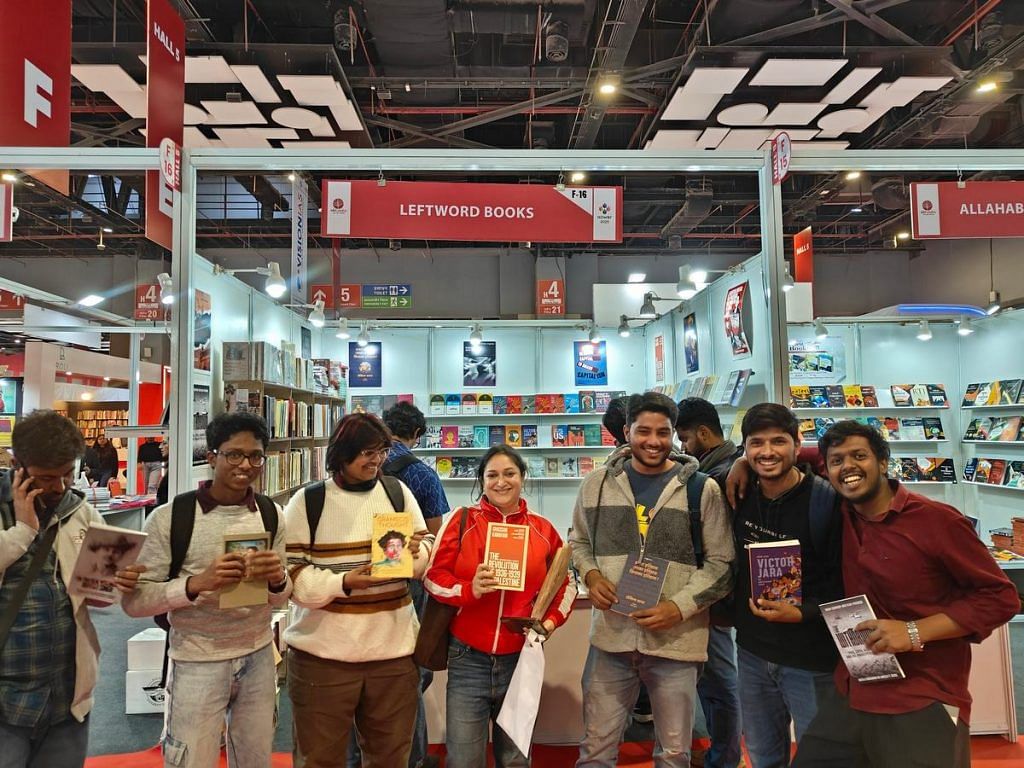
Earlier this year, it published Praxis of a Socialist, a compilation of essays by Sitaram Yechury, just months after the CPI(M) leader’s death. Edited by Deshpande and Prashad, it includes hiscritiques of communalism and Hindutva. The cover features a young Yechury, cool and aloof.
“There was no question about it [publishing the book]. There was a personal connection. He had been one of the directors and somebody we looked up to as a comrade and leader,” said Deshpande. “But we don’t always have the bandwidth or the appropriate person.”
Community and cadres, not just commerce
Mayday, the bookstore run by LeftWord Books in West Delhi’s Shadipur, is a sizeable distance away from what are considered Delhi’s buzzy intellectual centres. Inside, everything is transgressive, alternative—as if part of an imagined reality. It’s in the decor, the books, the pamphlets lining the counters. One of the publisher’s taglines reads: “We build communities, not commodities.” There’s a zine on the politics of pleasure and a CPI(M) booklet declaring: “Adani’s balloon is running out of gas.”
“I think people are interested in Left histories and in the possibilities of a Left for their lives. That is what they come to LeftWord to read. Obviously, we do not get all readers, but only those who are already interested in the Left,” said Prashad. “So, our readers are very interested in books that inform them about the building of socialism in the present.”
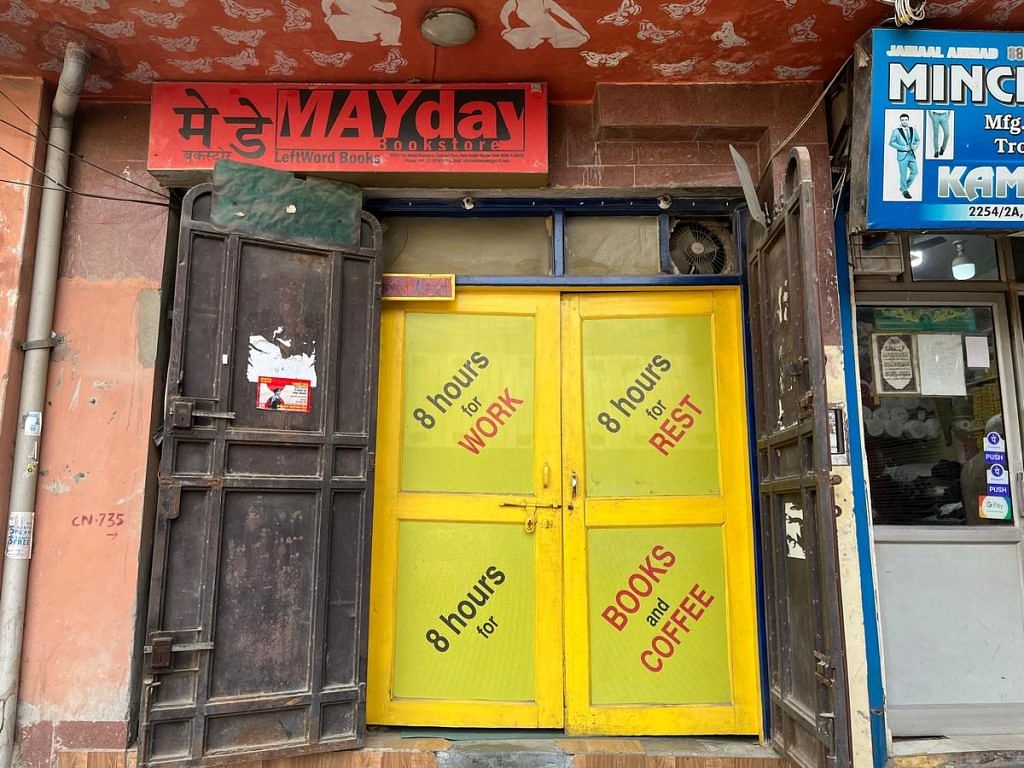
Critics have often said that the Indian Left is stuck in an anachronistic past, locked by ideology and unable to understand that times have changed.
The optics of the heady, revolutionary days of the past are still palpable in the Shadipur office of LeftWord Books.
On one wall is a photo taken in Jhandapur, where members of Jan Natya Manch (JANAM) returned to complete their performance of Halla Bol—the play the troupe was staging at the time of Communist playwright Safdar Hashmi’s 1989 killing. One of Leftword Books’ most sought-after titles is Deshpande’s Halla Bol: The Life and Death of Safdar Hashmi, published in 2020. Mayday is also connected to Studio Safdar, which describes itself as “an independent space for arts and activism”.
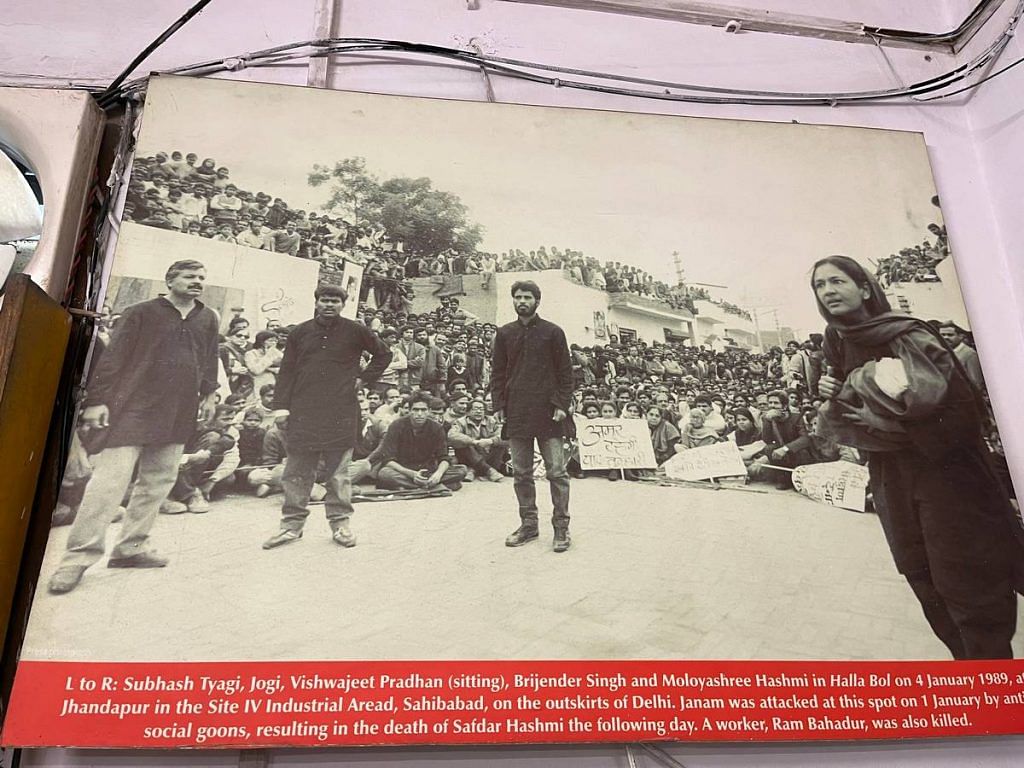
The space itself has taken on a special significance, part of a distinct counter-culture that’s a combination of ideas, books, and alternative thinking. It’s also a ritual.
Nitheesh Narayanan, a Student Federation of India activist and CPI(M) member, recalled a yearly pilgrimage to the Mayday sale, where books were sold at subsidised rates.
“It was the only day we woke up early,” he said, referring to his time at JNU.
What they [LeftWord Books] do is not just lip-service. It’s practice. They realise that we need younger cadres, not just scholars
-Nitheesh Narayanan, CPI(M) member and editor
Narayanan is also part of the LeftWord Books stable, having edited two volumes of essays. The first was published in 2021—the centenary of the Malabar Uprising—and includes six essays by important Communist voices of the time.
Despite it being his idea, he wrestled with the anxieties of being a literary newcomer who didn’t belong to the well-established, privileged circles of the Left. He never imagined he’d be credited as editor— that too alongside a prominent voice like Vijay Prashad.
“Vijay Prashad immediately told me we are doing this book and that I was the editor. I had never prepared a book, and Delhi is not a space that would by default naturally endorse people like me,” he said.
Publishing with LeftWord Books gave him a legitimacy he hadn’t expected. Copies of 1921 Uprising in Malabar were sent to academic powerhouses like Romila Thapar and Irfan Habib. It was also launched at the Party Congress in Coonoor, his home district.
“What they [LeftWord Books] do is not just lip-service. It’s practice. They realise that we need younger cadres, not just scholars,” Narayanan said.
Also Read: A Cloud Called Bhura to Hello Sun, Indian children’s fiction is telling climate stories
Capitalism is the real clampdown
When LeftWord Books started out, it operated with a tiny team of four. Today, that number has grown to 12. This year they’re upping the ante and plan on publishing 25 books. Each title only gets an average of 200 to 250 copies, but the covers are anything but bare-bones and frugal. They are stylish and designed to stand out.
Marketing Manager Suvendu Mallick is also taking LeftWord Books beyond Delhi, where there’s already a ready audience for progressive literature. But it’s not the easiest market to expand. In West Bengal and Kerala, where the party is active, books are mostly sold in regional languages. So, they’re targeting fresher markets.
“We’re selling more in Bangalore and Hyderabad than we are in Kerala,” Mallick said. “We’ve targeted other states like Maharashtra, Andhra Pradesh. Once you’ve established your network, you get regular readers.”
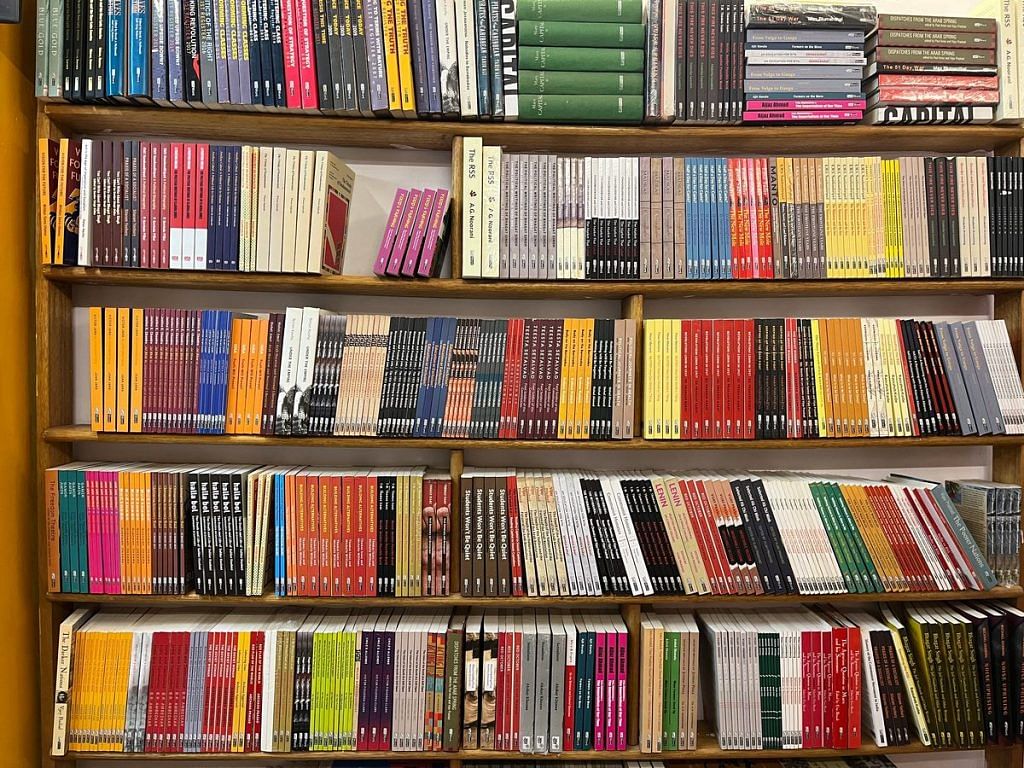
He estimates that about 10 per cent of their customer base is new each year. The publishing house is also trying to sweeten the deal with strategies like offering discounts to members of its book club. To appeal to readers in the Hindi belt, LeftWord Books launched the imprint Vaam Prakashan in 2021. They’re experimenting with graphic narratives as well, like Food and Farming, which explains India’s hunger crisis through comics strips.
What slows them down isn’t politics, but the more humdrum challenges of independent publishing—mainly, a lack of resources. Leftist publishers worldwide have consortiums, one of which, the International Union of Leftist Publishers (IULP), was started by LeftWord Books. This enables a relatively free exchange of texts, shielding them from the travails of an otherwise cutthroat industry.
“As the Right spreads an intolerant message around the world, our solidarity is very important in a material and personal way,” said Prashad.
But literal clampdowns are not the biggest anxiety.
“Our problems have nothing to do with the government but the general problem of capitalism,” said Deshpande. For him, India is better off in some ways than other countries, owing to its diverse and vibrant mix of small presses.
And as for the subject material, perhaps it’s eternal.
“Progressive people want to get their books published by LeftWord Books. It will reach the masses, and ideas will spread,” said Narayanan, who hopes to publish his travelogue on Cuba soon. “That’s how we support indie publishers.”
(Edited by Asavari Singh)


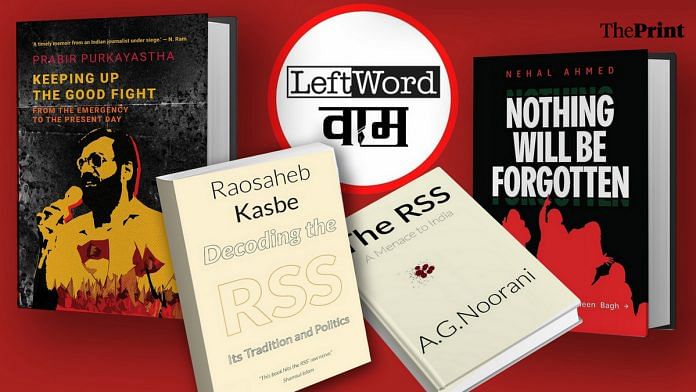


In a fascist, authoritarian regime, a publishing house whose bestseller is a polemic against the ruling party is thriving.
Doesn’t really go with the narrative, does it?
Modi is a Marxist – in his economic policies.
The gargantuan redistribution of wealth which has taken place in the last decade – from the middle classes to the poor – is proof of that.
And the emphasis on swadeshi, i.e., import substitution – is the cherry on the cake.
Stupid terrorists attacked tourists instead of LeftWord books.